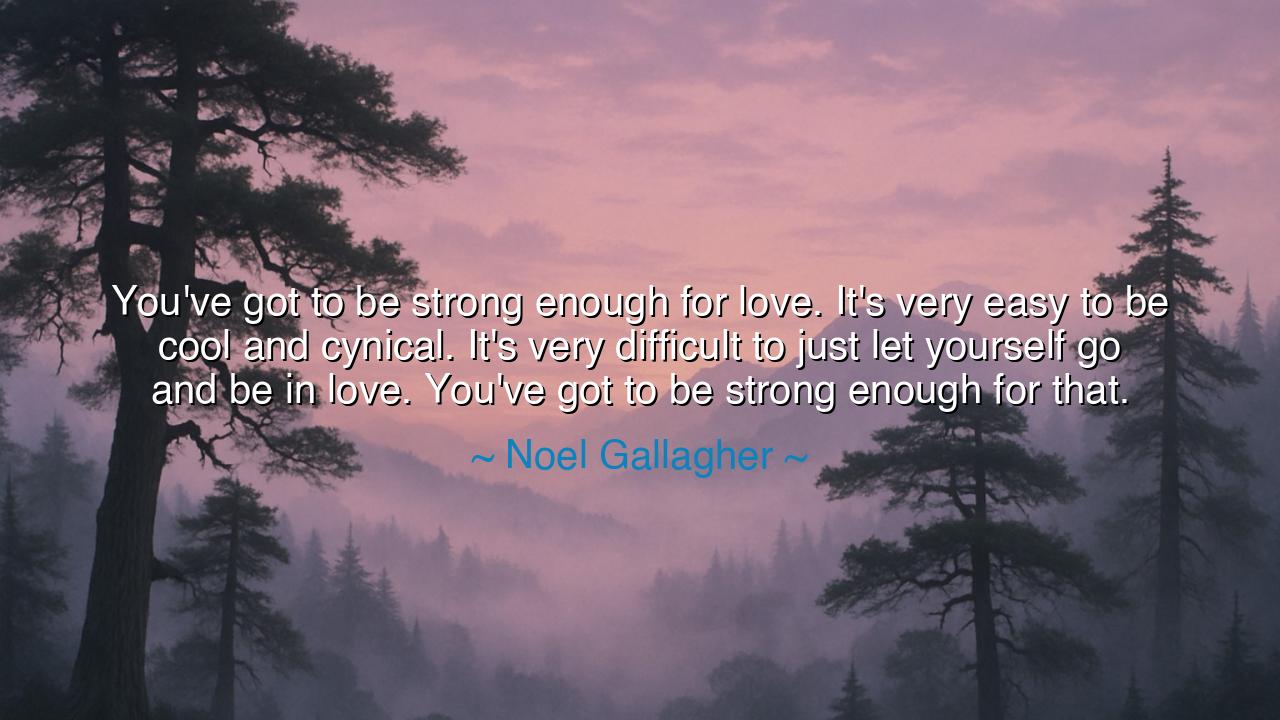
You've got to be strong enough for love. It's very easy to be
You've got to be strong enough for love. It's very easy to be cool and cynical. It's very difficult to just let yourself go and be in love. You've got to be strong enough for that.






In the vast tapestry of life, there is perhaps no more challenging or profound emotion than love. Noel Gallagher, in his reflection on the human heart, offers a powerful truth: “You’ve got to be strong enough for love. It’s very easy to be cool and cynical. It’s very difficult to just let yourself go and be in love. You’ve got to be strong enough for that.” With these words, Gallagher speaks to a deep and often overlooked aspect of the human condition—the strength required to embrace love in its purest and most vulnerable form. Love is not something to be taken lightly; it demands courage, vulnerability, and the ability to be open to both joy and pain. To love fully is to expose oneself to both the heights of bliss and the depths of heartbreak. It requires a strength that many are not willing to summon.
The ancients were keenly aware of the immense power and complexity of love. Plato, in his famous dialogue The Symposium, spoke of love not as a mere feeling but as a force that can transform individuals, shaping them into higher versions of themselves. In his philosophical exploration, love (or eros) is not simply a physical desire, but a spiritual longing that drives individuals toward truth and beauty. Yet, Plato also acknowledged that to love, one must be willing to engage with the deepest and most vulnerable parts of oneself. This strength that Gallagher refers to is the same inner fortitude that Plato described—the ability to confront one’s own fears, imperfections, and weaknesses in the pursuit of love.
Similarly, in the world of ancient Rome, the Stoic philosophers such as Seneca and Epictetus emphasized the strength of character required to love with integrity. The Stoics taught that true love is not an impulsive or fleeting emotion, but a disciplined, rational act that requires one to remain rooted in one’s values even in the face of emotional turmoil. To love with strength is not to give in to fleeting passions or superficial desires, but to cultivate a deep, steadfast affection that endures through trial and change. Like Gallagher’s insight, the Stoics recognized that cynicism and coolness are easy defenses against the vulnerability of love, but they ultimately prevent one from experiencing the fullness of life’s greatest gift.
One of the most enduring examples of the strength required for love can be found in the story of Antigone, the tragic heroine of ancient Greek drama. Antigone, the daughter of Oedipus, defied the orders of the king to bury her brother, Polynices, out of a sense of familial love and moral duty. She risked her life for the sake of a principle, driven by the strength of love for her family and the gods. In her act of defiance, Antigone embodied the kind of strength that Gallagher speaks of—courage in the face of adversity, sacrifice for a greater good, and the willingness to expose oneself to pain for the sake of love. Her story is a timeless reminder that love, in its truest form, often demands the courage to stand alone and face the consequences of one’s convictions.
Consider also the story of Socrates and his love for knowledge, which was a form of love that transcended the self. Socrates was willing to sacrifice his very life for his beliefs and his commitment to seeking truth. Though his love for his ideals led to his execution, it was through this strength of commitment that he left behind a legacy that continues to influence the world. Socrates’ example shows us that to truly love something or someone is to commit fully, even when the outcome is uncertain or the path is fraught with danger. Gallagher’s words resonate with this idea: love is not a passive state, but an active choice to engage and commit, regardless of the hardships one may face.
The lesson in Gallagher’s words is clear: love, in its purest form, requires a strength that goes beyond the superficial and the easy. In a world that often celebrates the cool, the detached, and the cynical, it is easy to shield oneself from the vulnerability that love demands. But as Gallagher rightly points out, it takes a far greater strength to love freely, without reservations, and to open oneself to the deep and often painful beauty of human connection. The coolness of distance, the protection of cynicism, may offer temporary comfort, but they do not allow one to experience the fullness of life’s most transformative force—love.
In our own lives, we must cultivate the strength to love without fear or hesitation. This strength is not about conquering the world, but about conquering ourselves—our fears, our insecurities, and our tendency to protect ourselves from the vulnerability of love. To truly love, we must be open, brave, and willing to take risks for the sake of something greater than ourselves. We must not wait for the perfect moment or the ideal circumstances but act in the present with courage. Whether in our relationships with others or in our commitment to truth, art, or service, the power of love can transform us, but only if we are strong enough to embrace it fully, without reservation. Let us live with the strength to love, for in love lies our greatest power and our greatest growth.






AAdministratorAdministrator
Welcome, honored guests. Please leave a comment, we will respond soon